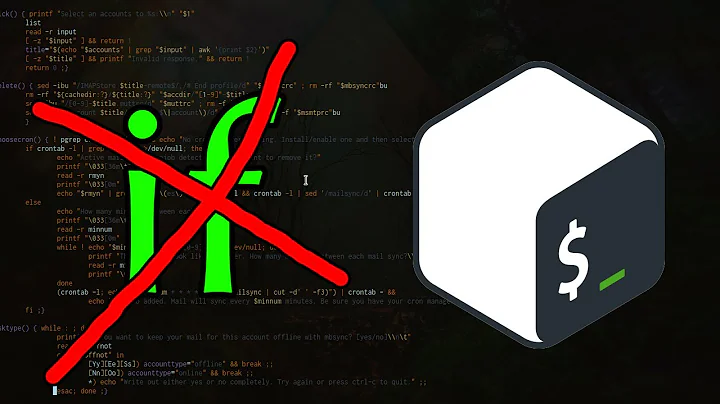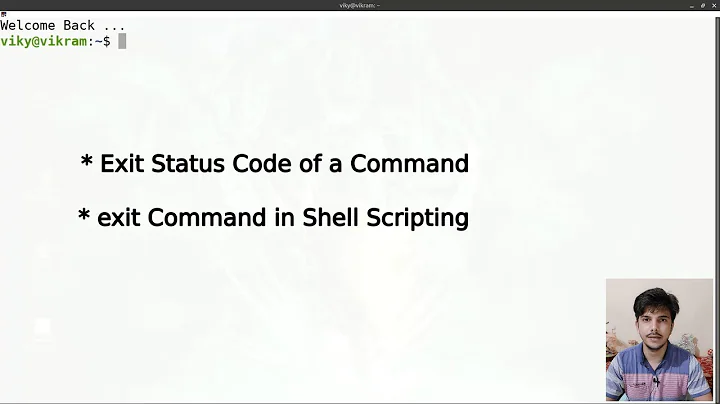Exit code at the end of a bash script
Solution 1
The builtin command exit exits the shell (from Bash's reference):
exit [n]
Exit the shell, returning a status of n to the shell’s parent. If n is omitted, the exit status is that of the last command executed. Any trap on EXIT is executed before the shell terminates.
Running to the end of file also exits, returning the return code of the last command, so yes, a final exit 0 will make the script exit with successful status regardless of the exit status of the previous commands. (That is, assuming the script reaches the final exit.) At the end of a script you could also use true or : to get an exit code of zero.
Of course more often you'd use exit from inside an if to end the script in the middle.
These should print a 1 ($? contains the exit code returned by the previous command):
sh -c "false" ; echo $?
sh -c "false; exit" ; echo $?
While this should print a 0:
sh -c "false; exit 0" ; echo $?
I'm not sure if the concept of the script "failing" when executing an exit makes sense, as it's quite possible to some commands ran by the script to fail, but the script itself to succeed. It's up to the author of the script to decide what is a success and what isn't.
Also, the standard range for exit codes is 0..255. Codes above 127 are used by the shell to indicate a process terminated by a signal, but they can be returned in the usual way. The wait system call actually returns a wider value, with the rest containing status bits set by the operating system.
Solution 2
0 means success, positive integers mean failure. There are 255 different error codes, but values 126 and above are reserved to indicate that a program couldn't start (126 or 127) or was killed by a signal (129 and above). See Default exit code when process is terminated? and What return/exit values can I use in bash functions/scripts? for more information.
The exit status of a shell script is the exit status of the last command that the script executed. So for example
#!/bin/sh
somecommand
returns the exit status of somecommand, whereas
#!/bin/sh
somecommand
exit 0
returns 0 regardless of what somecommand returned. This second script could also be written
#!/bin/sh
somecommand
true
Putting exit 0 at the end of a script doesn't necessarily cause it to return 0. This only makes it return 0 when the end of the script is reached. For example, the following script always returns 3:
#!/bin/sh
exit 3
exit 0
The following script also always returns an error code, in addition to displaying a message about a syntax error:
#!/bin/sh
}
exit 0
The following script returns either 1 or 0 depending on its first argument:
#!/bin/sh
if [ "$1" = "foo" ]; then
exit 1
fi
exit 0
The following script returns the status of somecommand, since set -e causes the script to exit if somecommand fails:
#!/bin/sh
set -e
somecommand
exit 0
Related videos on Youtube
Busted
Updated on September 18, 2022Comments
-
Busted almost 2 years
I am confused about the meaning of the exit code in the end of a bash script: I know that exit code 0 means that it finished successfully, and that there are many more exit codes numbers (127 if I'm not mistaken?)
My question is about when seeing exit code 0 at the end of a script, does it force the exit code as 0 even if the script failed or does it have another meaning?
-
 Hatclock almost 8 yearsIf a script ends with
Hatclock almost 8 yearsIf a script ends withexit 0, it will exit with the exit code of 0 regardless of what happens within the script. -
Busted almost 8 years@Hatclock why didn't you post your answer a full pledged answer ? as a comment I cant mark it, and I don't think you get fake internet points for answering (right?) Just a thought... (kudos for the fast reply)
-
 Gilles 'SO- stop being evil' almost 8 years@Hatclock No, not at all. If a script ends with
Gilles 'SO- stop being evil' almost 8 years@Hatclock No, not at all. If a script ends withexit 0, it will exit with the code 0 only if that last instruction was executed. The only impact ofexit 0at the end of the script is to return 0 instead of the status from the previous instruction. -
 Hatclock almost 8 years@Gilles That was more of an ambiguously worded reply on my part. If a script runs
Hatclock almost 8 years@Gilles That was more of an ambiguously worded reply on my part. If a script runsexit 0at any point it will return exit code 0 regardless of what has happened prior to that.
-
-
Busted almost 8 yearsCool, I didn't know about the 8 bits exit codes numbering. Thanks!
-
 Stéphane Chazelas almost 8 yearsNote that when a process is killed, it does not exit with an exit code > 127. It's just that some shells set
Stéphane Chazelas almost 8 yearsNote that when a process is killed, it does not exit with an exit code > 127. It's just that some shells set$?to 128+signum in that case. See Default exit code when process is terminated? for details. -
 ctrl-alt-delor almost 6 years
ctrl-alt-delor almost 6 yearsexit 0will only return 0, if the exit is executed. (it could exit by a different route).




